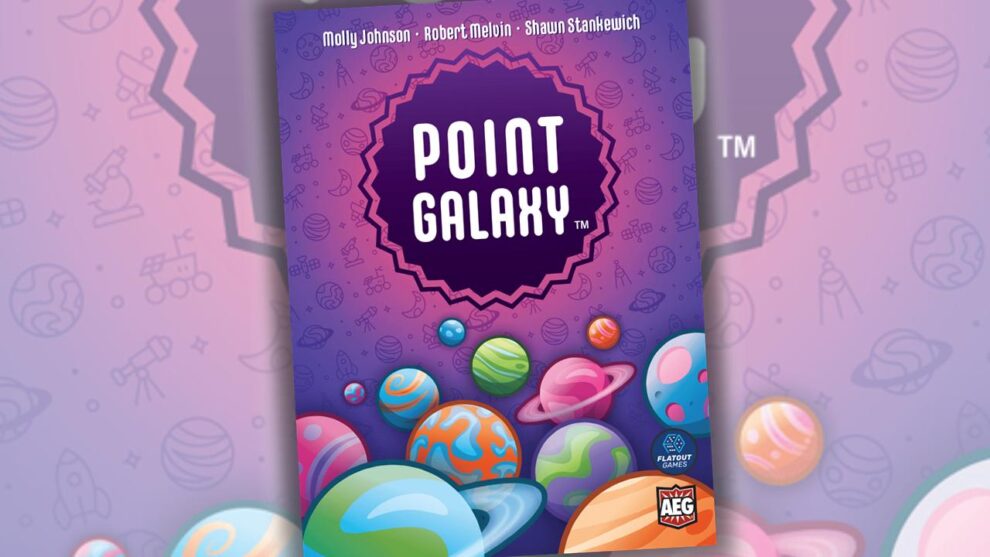Disclosure: Meeple Mountain received a free copy of this product in exchange for an honest, unbiased review. This review is not intended to be an endorsement.
I remember the first time I played Point Salad from the Flatout Games crew: double-sided cards, quick turns, quirky artwork, and the simplicity it offered. It lived rent free on my gaming table for weeks, and I’d break it out with friends every chance I got. Then a few years later the team released Point City, which was different but still great, keeping some of the things I loved about the original. And now, years later again, the crew are releasing Point Galaxy. At this rate, what’s next? They’ll have to break into the multiverse…or better yet, we find out that all the galaxies from this new game are just toppings on your Point Salad! Hmmmm.
But I digress, I’m here to tell you about Point Galaxy, and why you might want to consider backing this one on Kickstarter.
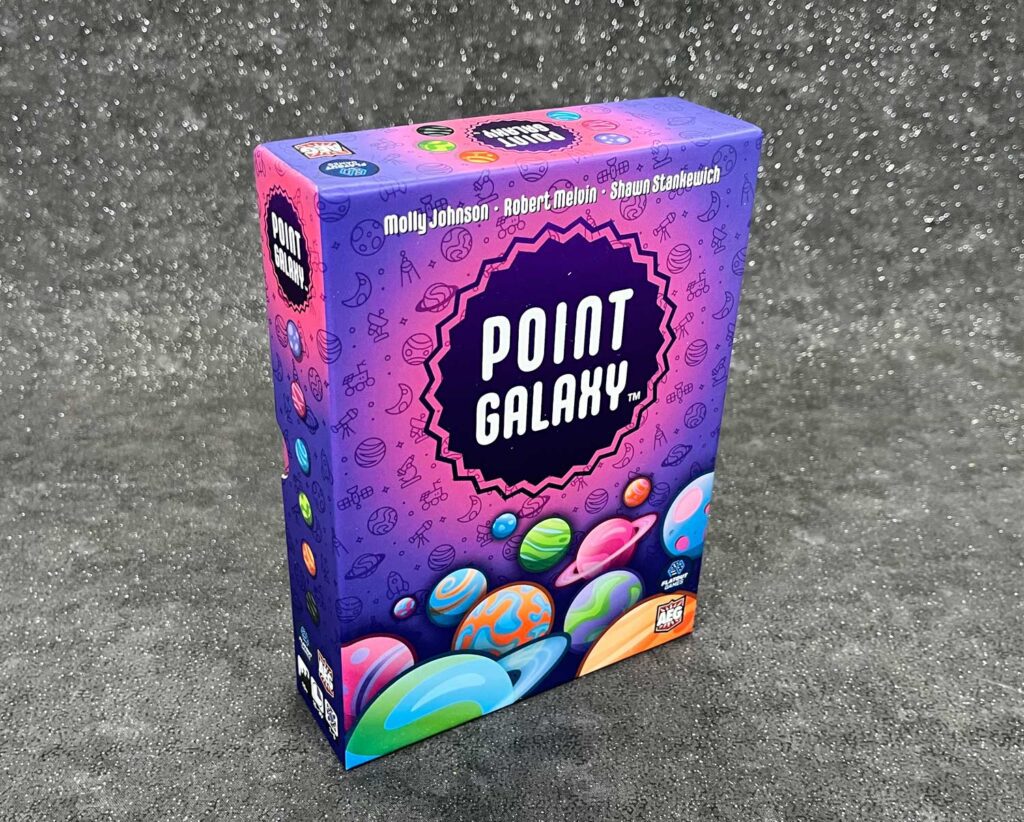
Point Galaxy Overview
If you loved Point Salad, but wished it had been just a bit more strategic, then I’ve got great news for you! Point Galaxy uses many of your favorite mechanisms from the original game and adds a healthy dose of strategy and planning.
In Point Galaxy, players act as architects of the cosmos, organizing celestial bodies into pleasing arrays (my words not theirs). You’ll draw cards from the familiar Point Salad-esque 9 card grid, and place them into one of your newly formed solar systems in order to earn points (it always comes down to points, doesn’t it?). One side of the cards has planets, while the other side has suns, moons, asteroids, or wormholes. And after 12 turns, the game ends and players tally up their scores.
Point Galaxy Setup
Setup for Point Galaxy is almost as simple as for Point Salad. Everyone gets one starting sun card (marked with a special symbol), which displays an end game scoring condition. This gives you a bit of direction in the beginning of the game.
Then the remainder of the cards are shuffled and split into three roughly equal sized decks with the black side face up. Flip over two cards from each pile, forming a grid like so.
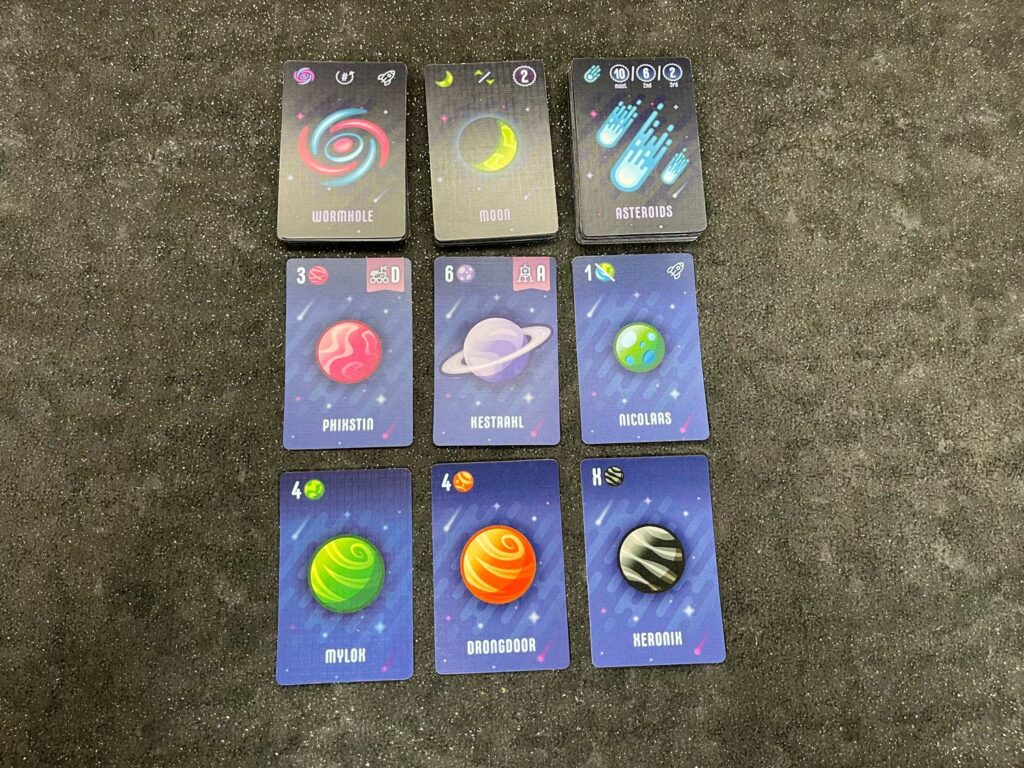
Shuffle the rocket tiles face down, then flip a number of tiles face up according to player count.
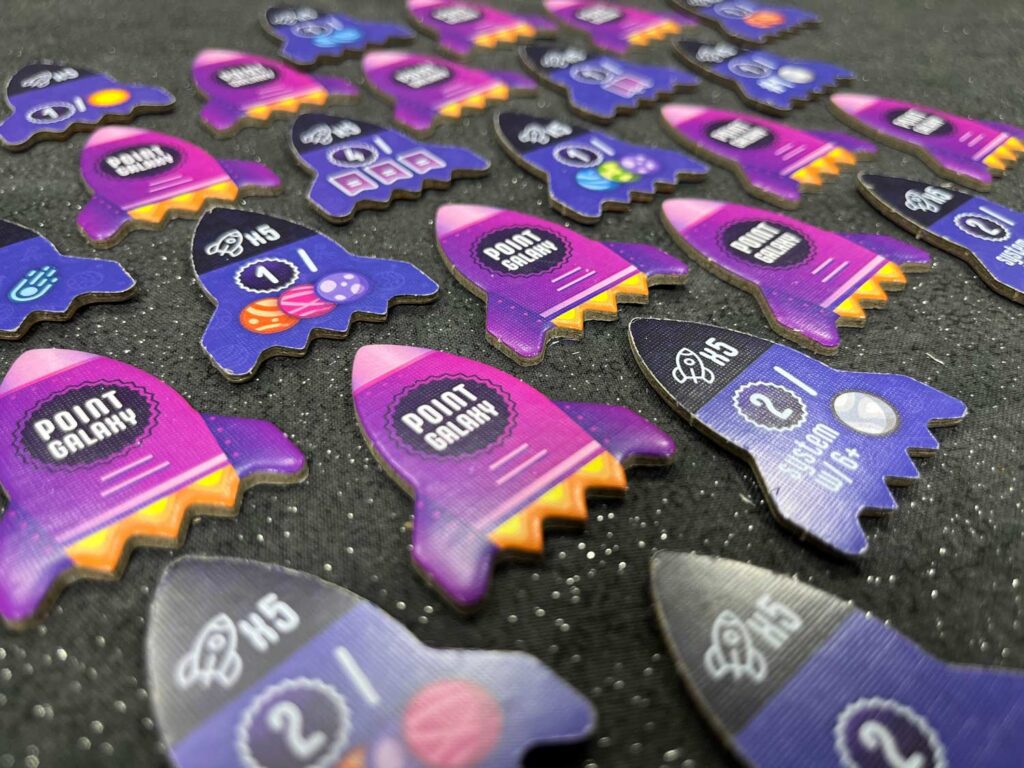
And you’re good to go.
Point Galaxy Gameplay
As indicated by the title, the goal of the game is points. In Point Galaxy you’ll earn them by drawing cards and placing them into your solar systems, so let’s talk about those.
Each solar system contains a sun card, 0 or 1 asteroid cards, and one or more planet cards, wormholes, and moons. The planet cards are numbered 1-7 and you’ll earn points based on the number of unique values in each solar system. As you place planet cards into your solar system, keep in mind that they must be organized into ascending or descending order. It’s okay to skip numbers, but once you’ve placed your second card, the order is determined and must be maintained. End game scoring for planets motivates you to keep the numbers sequential whenever possible.
In addition to the number, each planet card also contains one or more scoring possibilities, usually some combination of planet color, rocket icon, or research icons. This means that simply drawing a card based on its number isn’t as straightforward a decision as it might be (remember you did ask for a bit more strategy!). You’ll have to balance all the multiple factors and aim for the one most likely to earn you points. Here’s an example of what a galaxy might look like near the end of the game.
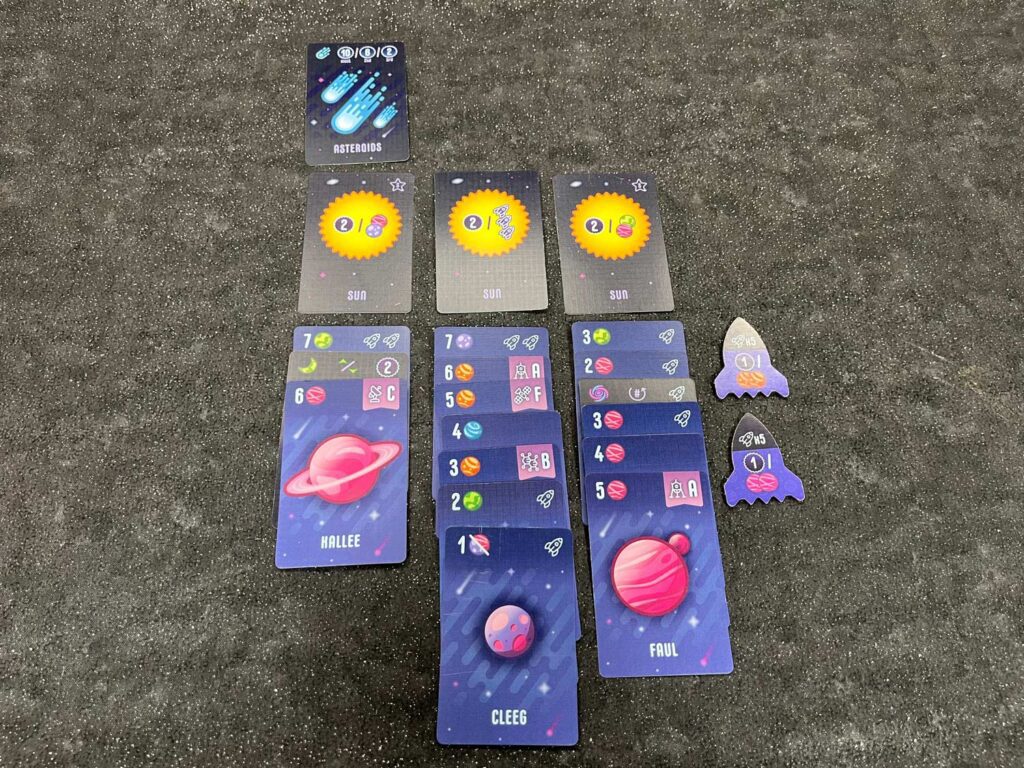
This player has collected one asteroid card. These cards are majority scoring, with the player who has the most earning 10 points, and other players collecting fewer points. Each galaxy can have at most one asteroid card.
The first solar system has a moon card between the 7 and the 6. Moon cards have no number, but they do have a color. This requires them to be placed next to a planet card of the same color. Some moon cards feature two colors, which means it must be between planets of both colors.
The middle column has a completed set of planet cards and a good collection of rocket and research icons. For every 5th rocket icon you collect, you will be able to choose one of the remaining rocket tiles, which contain a mix of straight bonus points and set collection scoring.
The last column contains a wormhole. These cards allow you to break the ascending/descending rule and “go backwards” from the point at which they’re inserted into your solar system. This makes it easier to “fill in the gaps” in your sequence, but remember you only score for uniquely numbered planet cards, do doubling up on a number won’t help you out.
A quick note: as you draft cards from the center display, they can be placed into any solar system, and more importantly, can be below or on top of an existing sequence of cards. So even if you start a solar system with a 3, you can still place a 2 or a 4 underneath it, or on top of it. This is a subtle rule that we played incorrectly in our first play. And remember, moon cards can always be inserted between other cards, but planet cards cannot.
After the 13th turn, the game ends and players tally up their scores. The cosmic being with the most points is the winner.
Point Galaxy Final Thoughts
I wanted to teach my gaming group how to play Point Galaxy, but I didn’t want to read from the rulebook. So I took advantage of the solo rules to learn the game, so that I could teach it from my brain instead. Solo gaming isn’t my personal favorite, but it’s perfect for situations like this, where you can learn the game in a structured way without having to bend the rules around to make it work for just one person. And to be honest, it worked quite well at one Kudos to the team for really honing the solitaire gameplay.
I was also quite pleased with the multi-player gameplay as well. There are a few things I can always expect in a Flatout Games title, one of my favorites being set collection. This is one of my favorite mechanisms in gaming, I guess because I like collecting things in real life too. Their designs always give you hope that you’ll be able to collect everything you need to score all the points, without ever fully delivering. And that’s a good thing because it always leaves you thinking, ”next time I’ll do it a little differently and then I’ll collect all the things!”.
Take the sun cards: you might look at one and think “this would be so easy to get all purple and pink planets, of course I’m going to use that to start a solar system”, only to realize a few turns later that all the good cards are green and blue, or the pink and purple cards don’t have rocket icons, or they’re the wrong number for your sequence. These are all things that have happened TO ME while playing this game. So rather than a guarantee of delivering, Point Galaxy teases you with a future of what might be, if there were no other players to interfere with your plans.
The rocket tokens are a great addition. Since you don’t get one until you’ve collected at least 5 rocket icons, you’re going to be at least 3-5 turns into the game (out of 13), and by that point you probably have a good idea of what scoring conditions you’re going for. And that means when you finally do get to pick a rocket token, you could potentially pick up a token that really synergizes with your existing scoring options.
The asteroid cards are always a fun race, and in fact can be where some of the “take that” can come from. The player in the lead scores 10 points, but if two players are tied for first place, they each only get 8 points. And so if you’re doing well in solar system scoring, it might actually be worth forcing a tie to prevent your opponent from getting those extra two points. And this could affect the third place player who might also get fewer points. There are lots of things to think about while playing this game.
I’m always excited to try new Flatout Games releases, and even more so when they’re connected to Point Salad. Their design team makes games that just speak to me. And Point Galaxy is no different. It presents a bright and colorful facade over a clever card game with drafting, set collection, and just a bit of “take that”. Point Galaxy might not win any awards, but Molly, Robert, and Shawn are always finding new ways to combine familiar elements into pleasing and fun arrangements.
Make sure you check out Point Galaxy, and its sister game Propolis on Kickstarter soon.


